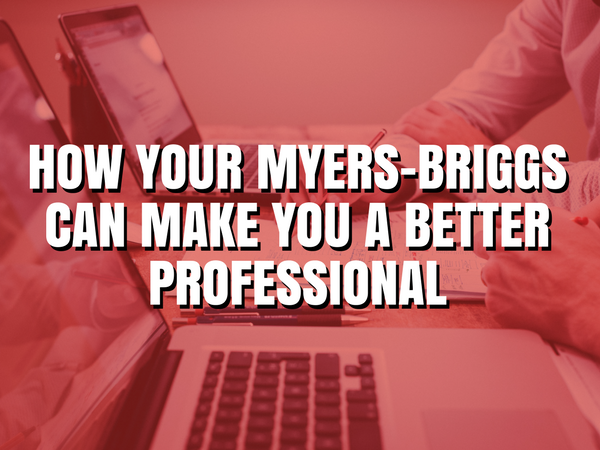
HOW YOUR MYERS-BRIGGS CAN MAKE YOU A BETTER PROFESSIONAL
Yes, those tests that ask you a bunch of questions about how you would handle super random situations and whether you keep your room messy or clean can tell you a lot about yourself as a person and coworker. You are one of sixteen personality types and with each come strengths and weaknesses that you bring to the office every day, whether you realize it or not.
Learning more about your personality type can help you emphasize the good qualities you can bring to your team and help you understand where you should lean on your co-workers, or devote some time to personal development. Take the test for a full report on how you interact with your co-workers as a subordinate, colleague and manager, as well as how you handle all the other relationships in your life.
There is no ‘good’ or ‘bad’ personality type for a professional, but understanding the characteristics of the traits below can help you become a more productive member of your team.
EXTRAVERT OR INTROVERT: WHAT ENERGIZES YOU?
E: Extraverts crave social stimulation and feel better when they are surrounded by people. They would rather brainstorm in large groups and like to talk problems out or think out loud with other people, but can sometimes wind up dominating conversations.

I: Not to be confused with shyness, introverts prefer smaller settings with trusted colleagues. They may take more time to come up with just the right answer, rather than offering all possible options. Their need to think through problems can come across as uninterested, but is usually just internal processing.

SENSING OR INTUITION: HOW DO YOU PERCEIVE INFORMATION?
S: Sensors process information in the present and rely on concrete facts to make practical decisions. Inclined to receive information in the form of hard data quantifiable numbers, sensors are very realistic.

N: Sometimes considered daydreamers, intuitions focus on the future and potential. More the “glass-half-full” kind of mindset, these abstract thinkers are very idealistic.

THINKING OR FEELING: HOW DO YOU PROCESS INFORMATION?
T: Thinkers are ruled by their heads and make decisions based on the facts in front of them. Thinkers are great pragmatic decision-makers but can sometimes come across as hard and firm.

F: Feelers are ruled by their hearts and make decisions based on their gut feelings. Thinkers are very empathetic and considerate, but may need to work on taking criticism and dealing with confrontation.

JUDGING OR PERCEIVING: HOW WILL YOU ACT ON THIS INFORMATION?
J: Judges like order, organization and rules. Not to be confused with judgmental, judges are often very responsible and crave structure and planning, but can become lost when a task is open-ended.

P: Perceivers are adaptable and relaxed. Their easygoing nature can mean they are very flexible in the workplace, but it also makes them more inclined to procrastinate, and they can feel overwhelmed by tight deadlines.

Whether you are a manager or an intern, understanding the way your personality plays with your colleagues’ inclinations and tendencies can help you ask for the things you need to be an effective team member.
There are many tests and quizzes that can help you learn more about yourself, so if Myers-Briggs doesn’t seem like the right fit, keep looking! Introspection and personal development are the best ways to become a better communicator in every part of your life. (Spoken like a true introvert!)
